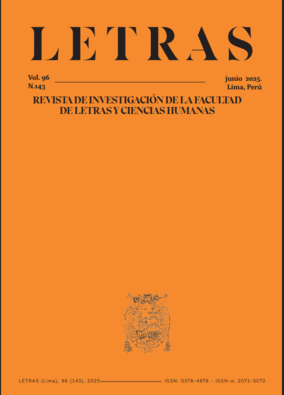Undressing the superman: seventy years after “Collacocha” by Enrique Solari Swayne
Abstract
Collacocha by Enrique Solari Swayne is, without any doubt, an emblematic play of the Peruvian theatre of the 20th century. The consensus it achieved in the field of theatre as well as in the imaginary citizenry, maintained its validity for decades through stagings and publications in Peru and abroad. The present work gives an account of the history and context of its production, reception and the debates that took place by analyzing interviews, testimonies, reviews, editions, in addition to what literary criticism and the history of theatre have to say. Likewise, the analysis of the play attempts to answer the reason for its success and validity, what impact it had in the field of national theatre, how it achieves such a consensus, what dramaturgical and ideological mechanisms it mobilized. The main character, Echecopar, as emblematic as the play itself, is deconstructed through the analysis if the different discourses it represents: sexist, anti-oligarchic, anti-communist, ante-internationalist, anti-intellectual, anti-poetic, authoritarian, intolerant, paternalistic, violent and patriotic. This exercise leads us to discover that many of these discourses are still in force and active in Peru and that the mechanism of polarization on which the play builds its protagonist continues to be an efficient means of ideological pressure.Downloads
Métricas alternativas
References
Álvarez, L. (1956, junio 10) El director escénico Luis Álvarez relata cómo concibió el montaje de Collacocha. En Suplemento Dominical. El Comercio.
Álvarez, L. (1994) Mi grano de arena. Inédito.
Analista (1956, mayo 25). Collacocha. En diario El Comercio.
Analista (1958, OCTUBRE 15) Collacocha: avanzada generacional. El Comercio.
Belaunde, F. (1959) La conquista del Perú por los peruanos. Ediciones Tawantinsuyo.
Castro Arenas, M. (1957) Conclusión. En Nos escriben, revista Caretas, 141, 12-26 de setiembre.
Cornejo Polar, A. (2003) Escribir en el aire. CELACP – Latinoamericana editores. Cultura Peruana (1959) “Collacocha en Madrid”, febrero.
Daniel, J. T. (1970) La estructura mitica de Collacocha, de Enrique Solari Swayne [Doctoral dissertation], University of Virginia.
Elmore, A. (1957) Collacocha. En columna Culturales de Caretas, 139, 14 al 29 de agosto.
Elmore, A. (1957 a) Aclaración. En columna Culturales de Caretas, 141, 12 al 26 de setiembre.
ENSAD (2025) https://www.ensad.edu.pe/ppp2025/collacocha/
Geiger (1956, mayo 21) Collacocha de Enrique Solari Swayne. En Crónica de Artes. La Crónica.
G.R. (1956, mayo) Collacocha de Solari Swayne. Cultura Peruana.
Gutiérrez, N. (1946) “Esa luna que empieza”, La Crónica, 28 de agosto.
Hernández, J. A. (1956, junio 26) E. Solari y su Collacocha. En Diario El Comercio.
Lawson, J. H. (2013) Teoría y técnica de la escritura de obras teatrales. Madrid: Publicaciones de ADE.
Miró Quesada, A. (1948) “Prólogo”, Teatro Peruano Contemporáneo, Lima: Editorial Huascarán. https://doi.org/10.30920/letras.96.143.11
Morris, R. (1977) The contemporary Peruvian Theatre. Graduate Studies 15. Texas Tech University.
Natella, A. (1971) Enrique Solari and Collacocha. Latin American Theatre Review. Spring 39-44. https://journals.ku.edu/latr/article/view/112
Obregón, O. (2001) Collacocha, de Enrique Solari Swayne, la construcción de un paisaje nacional peruano. Cahiers du CRICCAL, 26, 2001. Le paysage, v1. pp. 23-36. https://www.persee.fr/doc/ameri_0982-9237_2001_num_26_1_1494
P.L. (1956, mayo 22) Collacocha de Enrique Solari en la AAA. El Comercio.
Ríos, J. (1953) “Pertenece al teatro poético dice el autor de Ayar Manko”, La Prensa, 4 de junio.
Solari Morgan, S. (2009) Prólogo. En Obras incompletas. Enrique Solari Swayne.
Solari Swayne, E. (1956. 10 de junio) Enrique Solari S., autor de ´Collacocha´ resume su obra en tres frases esenciales. Suplemento Dominical. El Comercio.
Solari Swayne, E. (1957) Collacocha. Lima: Servicio de Publicaciones de la Escuela Nacional de Arte Escénico (ENAE) (mimerografiado).
Solari Swayne, E. (s/f ¿1958?) Teatro Nacional del Perú, Ministerio de Educación (mimeografiada).
Solari Swayne, E. (1959) Collacocha. Servicio de Publicaciones del Teatro Universitario de San Marcos (TUSM) (mimerografiado).
Solari Swayne, E. (1959, 1963) Collacocha. En Teatro Peruano Contemporáneo. Prólogo de José Hesse Murga. Madrid: Aguilar.
Solari Swayne, E. (1960, junio-julio) Enrique Solari y Collacocha, un binomio coronado por el éxito. Cultura Peruana, 144-145.
Solari Swayne, E. (1961) Collacocha. IBM World Trade Corporation.
Solari Swayne, E. (s/f, ¿1963?) Collacocha. Populibros Peruanos, serie 1.
Solari Swayne, E. (1965) Collacocha. Teatro Hispanoamericano tres piezas. Frank Dauster (comp.). Hartcourt Brace and World.
Solari Swayne, E. (1969) Collacocha. Editorial Rocarme S. A.
Solari Swayne, E. (1992, 2004) Collacocha. Editorial de la Facultad de Letras - Universidad Nacional Mayor de San Marcos
Solari Swayne, E. (2005) Collacocha. Editorial Bruño.
Solari Swayne, E. (2009) Collacocha. En Obras incompletas. PTYX Editores SAC.
Solari Swayne, M. (1957, mayo 24) Gran éxito de Collacocha y del actor Luis Álvarez. El Comercio.
Teatro La Plaza (2025) https://laplaza.com.pe/archivo/
Veltrusky, J. (1997) “El texto dramático como uno de los componentes del teatro” En Teoría del Teatro, Arcos Libros.
Vidal, H. (1988). Desarrollismo, teatro y cultura nacional peruana: No hay isla feliz de Sebastián Salazar Bondy y Collacocha de Enrique Solari Swayne. Gestos, 3(5), 53-84.
Zapata, A. (2021) Lucha política y crisis social en el Perú republicano 1821-2021, Fondo editorial PUCP.
Copyright (c) 2025 Letras (Lima)

This work is licensed under a Creative Commons Attribution 4.0 International License.
Este obra está bajo una licencia de Creative Commons Reconocimiento 4.0 Internacional



















